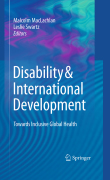
Disability & international development: towards inclusive global health
MacLachlan, Malcolm
Swartz, Leslie
One of the greatest challenges facing modern global health is how to include the most marginalized and impoverished people in international efforts to promote social and economic development. In Disability and International Development disability rights are situated within the broader context of global health and the need for much greater inter-sector collaboration. Reports from a broadcross-section of low- and middle-income countries—locales as diverse as Zimbabwe, Bolivia, Kyrgyzstan, and Papua New Guinea—move beyond surface discussionsof 'what is working' and 'what shows promise' to discuss political and governance contexts, the roles of disabled persons in research by outsiders, concurrent struggles (e.g., women’s or children’s rights), and instructive inroads made by community activists and national Disabled People’s Organizations. The results are provocative, and offer new lenses for viewing both the issues and the populations they affect. Each of the book’s chapters spotlights a topic as representative of the enormity and immediacy of challenges to inclusive global health, including: The impact of international human rights law on domestic law and local traditions. The effect of failed states on the lives of people with disabilities. Empowerment and advocacy: disability organizations and movements. HIV/AIDS interventions with disabled persons. Assistive technologies in low-income countries. Strategies for improving the lives of children with disabilities. Cross-disciplinary as well as cross-cultural, Disability and International Development will attract a wide audience of professionals in rehabilitation, social welfare and human rights; governmental and non-governmental organizations and disabled people’s organizations; researchers and practitioners. It will also be relevant to those working in health and welfare administration, health policy, international aid and development, and human rights. In addition, graduate students in disability studies, public and global health and international development should find this an important guide to the future of thesefields. INDICE: 1: From the Local to the Global: the Many Contexts of Disability and International Development. 2: The Effect of Failed States on the Well-Beingand Lives of People with Disabilities. 3: The Impact of International Human Rights Law on the National Laws of Ethiopia from a Gender Rights and DisabilityRights Perspective. 4: Building an Inclusive National Strategy for Disabled Children in Kyrgyzstan through an Application of the BIAS FREE Framework. 5: Networking in Disability for Development: Introducing the African Network for Evidence-to-Action on Disability (AfriNEAD). 6: Building Disability Research Capacity in Low-Income Contexts – Possibilities and Challenges. 7: Empowerment, Advocacy and National Development Policy: A Case Study of Disabled Peoples’ Organizations in Bolivia. 8:Cultural Challenges in Piloting Disability Surveys inPapua New Guinea. 9: Disability and HIV/AIDS: A Key Development Issue. 10: Assistive Technology in Low-Income Countries. 11: Childhood Disability in Burkina Faso and Sierra Leone: An Exploratory Analysis. 12: Education, Disability, and International Development. 13: Listening to the Voices of Disability: Experiences of Caring for Children with Cerebral Palsy in a Rural South African Setting.
- ISBN: 978-0-387-93843-1
- Editorial: Springer
- Encuadernacion: Cartoné
- Páginas: 280
- Fecha Publicación: 01/08/2009
- Nº Volúmenes: 1
- Idioma: Inglés
